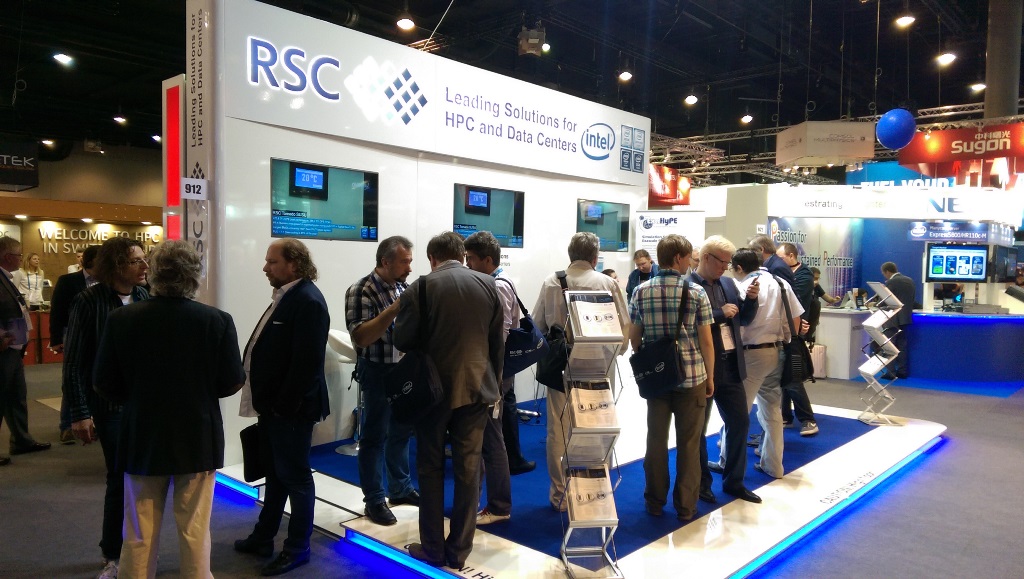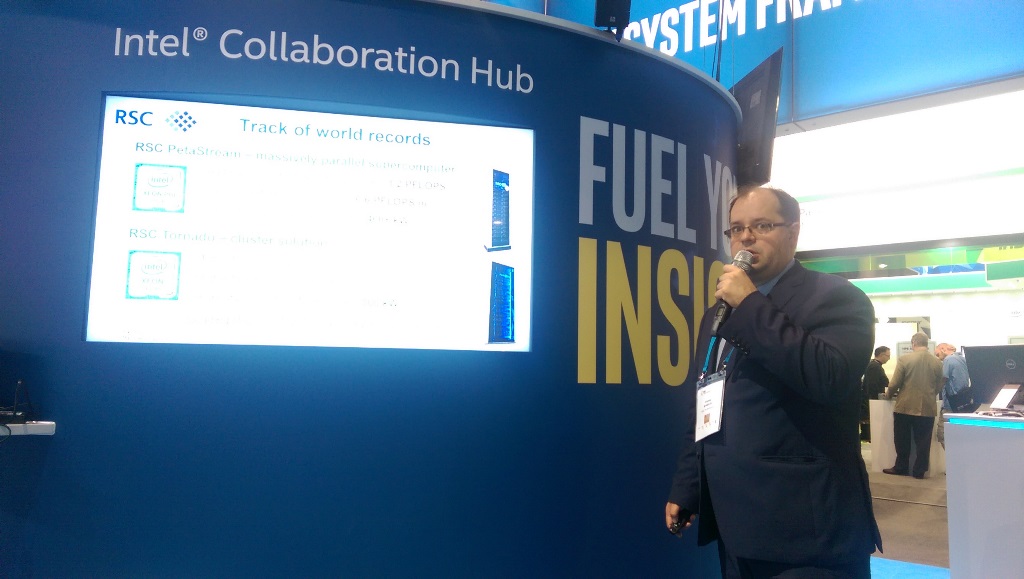RSC Group (Russia) has presented at ISC’16 conference a new generation of high-performance scalable and energy-efficient RSC Tornado solution with direct liquid cooling based on the newest multi-core Intel® Xeon Phi™ processor (previously code named as Knights Landing) on the day of global launch of this product. The new RSC solution has improved physical and computing density, high energy efficiency and provides stable operation in "hot water" mode with +63 °С cooling agent temperature.
Frankfurt-am-Main (Germany), International Supercomputing Conference (ISC’16), June 20, 2016 — RSC Group, the leading developer and system integrator of innovative solutions for high-performance computing (HPC) segment and Data Centers in Russia and CIS has demonstrated a new generation of its high performance, scalable and energy-efficient RSC Tornado solution with direct liquid cooling based on the newest multi-core Intel® Xeon Phi™ processor (previously code named as Knights Landing) on the day of global launch of this product at ISC’16 international conference and exhibition. New RSC solution has improved footprint and computing density, high energy efficiency and provides stable operation of computing nodes in “hot water” mode at +63 °С cooling agent temperature at node inputs. This confirms leading position of the company in the field of bringing the latest technologies for global supercomputer industry to the market and meeting growing customer demands.
New generation of RSC Tornado cluster solution has the following improved characteristics:
· high-end models of the latest multi-core (up to 72 cores) Intel® Xeon Phi™ 7250, Intel® Xeon Phi™ 7290 or Intel® Xeon Phi™ 7250F, Intel® Xeon Phi™ 7290F processors (“F” indicates processor versions with integrated high-speed interconnect Intel® Omni-Path),
· usage of new Intel® Server Boards S7200AP,
· highest physical density with up to 153 computing node in a standard 42U cabinet (80х80х200 cm),
· almost doubled computing density – 528 Teraflops (280 Teraflops in previous generation) in a standard 42U cabinet or over 412 Teraflops/m3,
· up to 192 GB RAM per node (DDR4-2400 RAM + 16 GB MCDRAM),
· simultaneous use of up to 2 SSD SATA drives and one PCIe SSD in M.2 form factor, such as Intel® SSD DC S3500 and Intel® SSD DC NVMe M.2,
· improved reliability – independent hydraulic pump modules (hydraulic regulation modules) of the liquid cooling system per a computing domain (up to 9 modules per cabinet) with redundancy level from N+1 to N+N,
· improved energy efficiency – provides necessary conditions for stable operation of computing nodes in "hot water” mode at +63 °С temperature at node input,
· new power supply module in computing node form factor providing efficient transformation of 220V (AC) to 400V (DC) and supporting parallel operation on common bus,
· updated design of computing cabinet with support of new high speed inter-node communication technologies including Intel® Omni-Path and Mellanox EDR InfiniBand,
· support of flexible colling system configurations with redundancy of both single hydraulic regulation nodes and the entire system.
RSC has demonstrated RSC Tornado computing node based on Intel® Xeon Phi™ 7250 multi-core processor on a new Intel® S7200AP server board with two Intel® SSD DC S3500 Series M.2 340 GB and one Intel® SSD DC NVMe M.2 PCIe solid state drives and switches and adapters based on Intel® Omni-Path and Mellanox EDR InfiniBand high-speed interconnects.
RSC Tornado cluster solution can also be implemented with Intel® Xeon® E5-2600 v4 server processors (including high-end model Intel® Xeon® E5-2699 v4) providing high computing density – 237 Teraflops in a standard 42U (80x80x200 cm) cabinet.
Innovative management and monitoring system of RSC solutions for high-performance computing also provides high availability, resistance to failures and ease of use. It can be used to manage single nodes and the entire solution, including infrastructure components. All elements of the system (computing nodes, power supplies, hydraulic regulation modules, etc.) have an integrated management module providing broad capabilities for detailed telemetry and flexible management. Cabinet design supports replacement of computing nodes, power supplies and hydraulic regulation modules (with redundancy) in hot-swap mode without interruption of system operation. Most components of the system (such as computing nodes, power supplies, network and infrastructure components, etc.) are software-defined, and this significantly simplifies and speeds up initial deployment, maintenance and future upgrades of the system. Liquid cooling of all components ensures their longevity.
Latest innovative approaches in new generation of RSC Tornado cluster solution enabled reduction of infrastructure costs within the scope of computing system development and provided capabilities for more flexible upgrades of single nodes and the entire system.
Therefore, RSC solutions for high-performance computing keep setting de facto high industry standards of physical and computing density, energy efficiency, reliability, availability and manageability.
“With unique extensive experience in development of highly efficient direct liquid cooling and ultra-dense integration of HPC solutions based on standard server components, RSC specialists has developed and presented a new generation of RSC Tornado cluster solution based on the latest multi-core Intel Xeon Phi processor (earlier code named as Knights Landing) right on the day of global launch of this product. RSC Tornado also has numerous improved characteristics highly demanded by customers operating powerful data centers. All RSC solutions are developed in Russia and we actively use the potential and production capacities of Russian manufacturing facilities," - said Alexey Shmelev, CEO of RSC Group.
Russian customers use solutions based on RSC Tornado cluster architecture with liquid cooling developed by RSC Group specialists in production environments for over six years. These solutions are installed and actively used for modeling and calculation of a broad range of scientific, research and industrial tasks by the St. Petersburg Polytechnic University named after Peter the Great (SPbPU), Joint Supercomputer Center of the Russian Academy of Sciences (JSCC RAS), South Ural State University (SUSU), Moscow Physics and Technology Institute (MIPT), Russian Weather Forecast Agency (Roshydromet) and other customers from different vertical industries.







